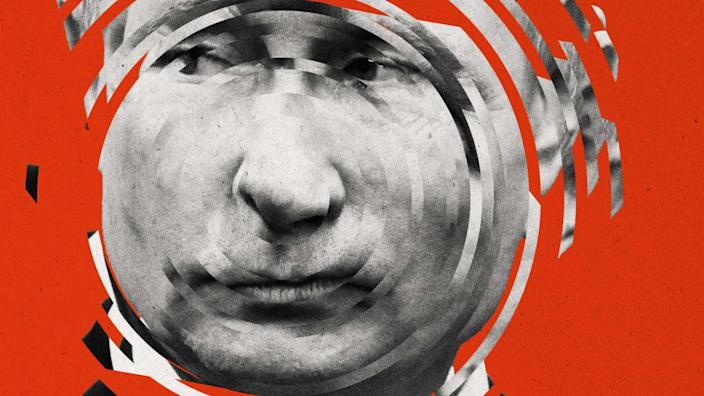
After a series of embarrassing setbacks in trying to capture Ukraine’s capital, Kyiv, over the past 40-odd days, Russian President Vladimir Putin has ultimately decided to have his forces retreat, and regroup to go after eastern Ukraine. But his cronies can’t seem to get the picture straight.
Putin loyalist Ramzan Kadyrov, the head of the Chechen Republic—also known as Putin’s “foot soldier”—said on his Telegram account this week that Russia will still be working to take Kyiv.
We will “take Kyiv and all other cities,” Kadyrov said.
The picture on the ground is far different, though. With Russian forces failing to take Kyiv, they left and abandoned that goal, instead focusing on the east. As recently as Tuesday this week, a senior U.S. defense official confirmed in a briefing that Russia is still focusing on the eastern portions of Ukraine.
In all fairness, Russia is working to take eastern portions of Ukraine, which Kadyrov mentioned as well. But for the moment, his messaging seems way off from Putin’s current planning process.
Chechen President Ramzan Kadyrov enters the hall during the meeting of State Council at the Grand Kremlin Palace, in Moscow, Russia, June 26,2019.
” data-src=”https://s.yimg.com/ny/api/res/1.2/hTyfxT4LOxnlvMoO631hgw–/YXBwaWQ9aGlnaGxhbmRlcjt3PTcwNTtoPTEwOTE-/https://s.yimg.com/uu/api/res/1.2/wqFFwz5kV5PNVXZuvyCGbw–~B/aD0xODEwO3c9MTE3MDthcHBpZD15dGFjaHlvbg–/https://media.zenfs.com/en/thedailybeast.com/b04e99320bd6d650e145496b0b0f6c5d”><img alt="
Chechen President Ramzan Kadyrov enters the hall during the meeting of State Council at the Grand Kremlin Palace, in Moscow, Russia, June 26,2019.
” src=”https://s.yimg.com/ny/api/res/1.2/hTyfxT4LOxnlvMoO631hgw–/YXBwaWQ9aGlnaGxhbmRlcjt3PTcwNTtoPTEwOTE-/https://s.yimg.com/uu/api/res/1.2/wqFFwz5kV5PNVXZuvyCGbw–~B/aD0xODEwO3c9MTE3MDthcHBpZD15dGFjaHlvbg–/https://media.zenfs.com/en/thedailybeast.com/b04e99320bd6d650e145496b0b0f6c5d” class=”caas-img”>
Chechen President Ramzan Kadyrov enters the hall during the meeting of State Council at the Grand Kremlin Palace, in Moscow, Russia, June 26,2019.
Mikhail Svetlov/Getty
But this isn’t a function of a war dragging on and messaging getting lost in the fog. The list of mishaps and communications not going according to plan goes back months. In mid-March, Kadyrov claimed he and Chechen forces were near Kyiv—a claim Kremlin spokesman Dmitry Peskov flat-out denied. And during a now notorious meeting with Russia’s Presidential Security Council in February, Putin lashed out at the chief of Russia’s Foreign Intelligence Service (SVR), Sergey Naryshkin, when Naryshkin spoke about Russia’s policy towards eastern Ukraine in a way that apparently irked Putin. Naryshkin hesitated and stammered his way through his words, molding them to Putin’s will as they went—and as Putin continually interrupted him.
The trouble might be self-inflicted, at least in part. Putin has isolated himself from his advisers while waging a war that is, unlike any war in Europe before, being documented in real time on social media. All eyes are on Putin and his cronies’ every move. And for Putin’s Russia, which isn’t built for transparency or message coordination and rollout, the fumbles are glaringly obvious.
“The Russians don’t practice this. It’s not an open society, they don’t talk to the press—they don’t even attempt to be transparent. Undoubtedly because it’s such a stovepiped system and they don’t have much experience or use in talking to the press it’s inevitable they’d be working at cross-purposes,” Douglas London, a former CIA chief of station, told The Daily Beast. “Putin is very much a stovepiped decision-maker in terms of how he delegates power and authority.”
Vladimir Putin speaks during a concert marking the anniversary of the annexation of Crimea, on March 18, 2022 in Moscow, Russia.
” data-src=”https://s.yimg.com/ny/api/res/1.2/m09C8E8ezpLPlKFeIZhEfw–/YXBwaWQ9aGlnaGxhbmRlcjt3PTcwNTtoPTQ3MA–/https://s.yimg.com/uu/api/res/1.2/tuBPSqSSElWW8beRQS_QUw–~B/aD03ODA7dz0xMTcwO2FwcGlkPXl0YWNoeW9u/https://media.zenfs.com/en/thedailybeast.com/b9839d41c6da55f8e6e9d793362b2af2″><img alt="
Vladimir Putin speaks during a concert marking the anniversary of the annexation of Crimea, on March 18, 2022 in Moscow, Russia.
” src=”https://s.yimg.com/ny/api/res/1.2/m09C8E8ezpLPlKFeIZhEfw–/YXBwaWQ9aGlnaGxhbmRlcjt3PTcwNTtoPTQ3MA–/https://s.yimg.com/uu/api/res/1.2/tuBPSqSSElWW8beRQS_QUw–~B/aD03ODA7dz0xMTcwO2FwcGlkPXl0YWNoeW9u/https://media.zenfs.com/en/thedailybeast.com/b9839d41c6da55f8e6e9d793362b2af2″ class=”caas-img”>
Vladimir Putin speaks during a concert marking the anniversary of the annexation of Crimea, on March 18, 2022 in Moscow, Russia.
Getty
Examining what Putin wants to do next in the war is like a game of Russian roulette—and many, even in Putin’s inner circle, are just throwing out ideas they think might stick, or that might align with what Putin wants, even if they have no clue what he’s thinking, according to Anton Barbashin, a Russian political analyst.
“Among the many decision-makers or elites in Russia… only a few have a clear-cut understanding of what is actually happening [including] what’s the strategy and how it evolves. We never know who exactly knows the situation,” Barbashin told The Daily Beast. “There’s just a lot of people speculating on how they understand the situation.”
Some of the fudged messages coming from advisers are tied to their interest in vying for attention from Putin and trying to show him just how loyal and useful they can be in the war.
“It’s essentially a competition to prove to the Kremlin, ‘Look, this version is better for Russia and I’m ready to execute it. I’m ready to be that institution that you can rely on to solve your problems,’” Barbashin said. “They’re showing specifically their loyalty to the Kremlin, to Putin, to the cause. And they’re trying to compete.”
Will Putin Abandon His Jailed Bestie in Ukraine?
An increasingly isolated and rage-filled Putin has found himself surrounded by advisers too scared to tell him things were not going well on the battlefield, though, leading him to have an inaccurate picture of the war, which may also contribute to bad messaging, according to top Biden administration officials.
“We believe that Putin is being misinformed by his advisers about how badly the Russian military is performing and how the Russian economy is being crippled by sanctions, because his senior advisers are too afraid to tell him the truth,” White House Communications Director Kate Bedingfield told reporters in a briefing last month.
Putin has cordoned himself off so much in recent months that it’s not clear anyone knows what Moscow’s next move will be.
“Generally speaking it is very hard to understand even for them, what is the decision… because the Kremlin doesn’t know yet,” Barbashin said. “That has been a Kremlin thing for decades now to work several options at the same time [and] depending on the circumstances choosing one.”
The messages from Kadyrov need to be taken with a sizable grain of salt because he is essentially operating as a kind of vassal ally to Russia—one with his own personal goals and interest in maintaining a foothold in Russian power circles.
“He’s a very special kind of duck in this mix,” Barbashin said. “The way he’s been engaged in this war, the way he is participating, is kind of like he’s acting on its own.”
Vladimir Putin visits the Vostochny cosmodrome, some 180 km north of Blagoveschensk, Amur region, on April 12, 2022.
” data-src=”https://s.yimg.com/ny/api/res/1.2/om391jiRnUFajeQ56HH7Gw–/YXBwaWQ9aGlnaGxhbmRlcjt3PTcwNTtoPTQ3MA–/https://s.yimg.com/uu/api/res/1.2/vaRWTlICm_8w52r6ifuPTw–~B/aD03ODA7dz0xMTcwO2FwcGlkPXl0YWNoeW9u/https://media.zenfs.com/en/thedailybeast.com/e92d09e9e927b85267e57df10df0d769″><img alt="
Vladimir Putin visits the Vostochny cosmodrome, some 180 km north of Blagoveschensk, Amur region, on April 12, 2022.
” src=”https://s.yimg.com/ny/api/res/1.2/om391jiRnUFajeQ56HH7Gw–/YXBwaWQ9aGlnaGxhbmRlcjt3PTcwNTtoPTQ3MA–/https://s.yimg.com/uu/api/res/1.2/vaRWTlICm_8w52r6ifuPTw–~B/aD03ODA7dz0xMTcwO2FwcGlkPXl0YWNoeW9u/https://media.zenfs.com/en/thedailybeast.com/e92d09e9e927b85267e57df10df0d769″ class=”caas-img”>
Vladimir Putin visits the Vostochny cosmodrome, some 180 km north of Blagoveschensk, Amur region, on April 12, 2022.
MIKHAIL KLIMENTYEV/Sputnik/AFP via Getty
Putin’s war has encountered a whole slew of other problems that have tripped Putin and his cronies up. Putin’s forces, for one, struggled to take Kyiv, a situation that “frustrated” Putin, according to a CIA analysis shared with U.S. lawmakers. A senior defense official said in briefings last month that a column of Russian forces was stalling outside of Kyiv due to failures of resourcing and a lack of fuel. Russian command and control has been a mess. And officials have been scratching their heads at why Russia launched a series of cyberattacks on Ukrainian banks and websites in advance of the invasion—but have largely failed to run a flurry of successful hacks while waging war in Ukraine, a move which some analysts say could have made their invasion more chaotic for Ukrainians, and lent an advantage to Russia.
U.S. intelligence officials eventually realized it wasn’t clear if Putin had a top military commander in charge of running the war in Ukraine, according to CNN. Units running different operations around Ukraine weren’t communicating with each other, making for a poor distribution of resources and lack of coordination, officials said.
Putin appears to know that he might need more coordination if he is going to walk away with any “positive” news to bring back to Russia. As Russia has retreated from Kyiv and works to regroup and refocus on the eastern portions of Ukraine, Russia is tapping Aleksandr Dvornikov, the chief of staff of Russia’s Central Military District, to be the top commander in Ukraine. And a military convoy north of Izyum might be poised to provide more logistics support to the offensive in eastern Ukraine, as a way to make up for lack of preparation earlier, a senior U.S. defense official said in a briefing Tuesday.
But this little bit of optics play—announcing a new leader—isn’t likely to overhaul the disorganized way the war is going for Russia, in particular because the military is just not equipped for an overarching command structure right now, London said.
“I don’t think it’s going to make for an immediate solution to a lot of the problems they’re having, particularly in terms of logistics, command control, and… morale,” London told The Daily Beast. “They may now have said they’ve got this overall battlefield commander… I don’t necessarily know it’s going to quite roll out that way because they’re not organized to work that way. They’re not organized to function in this overall very organized chain of command.”
Get the Daily Beast’s biggest scoops and scandals delivered right to your inbox. Sign up now.
Stay informed and gain unlimited access to the Daily Beast’s unmatched reporting. Subscribe now.




